Category: Plastic
-
Plastic Mythbusters Quiz: Faktencheck zu Plastik in der Umwelt
Zum Plastik in der Umwelt finden sich in den Medien eine Menge verschiedener Angaben, doch viele davon sind nicht wirklich fundiert. Wir haben acht häufige Behauptungen einem Faktencheck unterzogen und in ein Quiz verwandelt. Probiert es aus! Das englischsprachige Web-Quiz Plastic Mythbusters eröffnet einen spielerischen Zugang: Mit dem Tool können Besucher*innen ihr Plastikwissen testen. Welche…
-
Is it true that bioplastics are a sustainable alternative to plastics since they degrade quickly in nature?
This claim is certainly false. Some of the materials called “bioplastics” are only biobased (made from renewable resources) but not biodegradable. Other materials called “bioplastics” are biodegradable but need very specific conditions to disappear quickly enough. However, these conditions are often not found in nature. If biodegradable plastics end up in the wrong place, they…
-
Is it true that we consume up to a credit card’s worth of plastic every week?
This claim is certainly false. It misrepresents the state of scientific research. It is true that plastics have been found in the human body. Microplastics can be ingested or inhaled. However, the average quantity of plastic which enters the human body is unclear. Scientific estimates still differ strongly, however there is no doubt that ‘one…
-
Is it true that most plastic waste is recycled, so using a lot of plastic is not a problem?
This claim is certainly false, and very far from reality. Just a small percentage of plastic waste is recycled and turned into material for new products. The majority of plastic waste is landfilled, incinerated (burnt) or ends up in the environment. This is one of the reasons why the current level of plastics consumption is…
-
Is it true that there’s a solid island of plastic in the ocean, visible from space?
This claim is certainly false. The claim of “plastic islands” in the ocean which are the size of countries or even continents is false. There’s no doubt that plastic pollutes the oceans, just as it does rivers, lakes, the soil and the air. However, plastic on the ocean surface is not concentrated enough to form…
-
Is it true that 80 percent of plastics in the ocean comes from land, 20 percent from the sea?
This claim is uncertain. We could find no credible scientific source to back up it up. The percentage of land- and sea-based plastic inputs into the ocean has not yet been calculated on a global level and therefore remains unknown. Scientific studies show that the ratio of land versus ocean-based plastics can differ strongly depending…
-
Is it true that 90 percent of the plastic in the oceans comes from 10 rivers in Asia and Africa?
You can read this frequently, but this claim is probably false. It misquotes the results of research published in 2017. In that study, scientists estimated how much plastic enters the sea from rivers around the world. Ten of these river systems carried most of the plastic. But plastic also reaches the sea through other ways,…
-
Is it true that microplastics are present in drinking water?
This is true, microplastics have indeed been identified in drinking water. However, knowledge of the scope and impacts on human health is scarce. To fully understand the occurrence and impacts of micro- and nanoplastics in drinking water for human health, more research is needed.
-
Is it true that by 2050 there could be more plastic than fish in the ocean?
This claim is highly speculative, and probably false. We do not know how much plastic is currently in the ocean. There is no scientific estimate for how much plastic will be in the ocean by 2050. It is also unclear how much fish will inhabit the ocean by 2050.
-
SCHIRN Podcast: Plastik von Pop bis Politik
Im SCHIRN PODCAST zur Ausstellung PLASTIC WORLD tauchen wir in die Welt der Kunststoffe ein – eine Welt voller unglaublicher Möglichkeiten, aber auch problematischer Nebenwirkungen. In den drei Folgen spreche ich mit Plastikexpert*innen aus verschiedenen Disziplinen, darunter Kuratorin Martina Weinhart, Bodenökologe Matthias Rillig, Tiefseeökologin Melanie Bergmann, Biologe Martin Wagner und Politikwissenschaftler Per-Olof Busch. Hörer*innen erhalten…
-
50 Jahre Forschung zu Plastik im Meer
Plastikkügelchen in den Fischmägen, Kunststoffabfälle im Meer: Das ist seit Jahrzehnten bekannt. Warum hat es so lange gedauert, bis das Problem von Politik und Öffentlichkeit ernst genommen wurde? Für dieses Radiofeature – eine gekürzte deutsche Fassung der einstündigen Folge des englischsprachigen Podcasts “Plastisphere” – habe ich mich über ein Jahr lang auf die Suche nach…
-
Letters on the Plastics Treaty
Ahead of the negotiations for a new global Plastics Treaty, I teamed up with group of scientists and co-authored two letters published in the journal Science calling for a cap on production and the full inclusion of chemicals. You can find our letters here (production cap) and here (chemicals). I also co-authored a letter to the…
-
Plastic pollution needs more than voluntary, optional or market-led solutions
Read our opinion essay at Environmental Health News
-
Book Review (Undark): Coming to Grips With the Plastic Crisis
In “Thicker Than Water,” journalist Erica Cirino probes the history of plastic pollution, along with possible solutions. Read my review >
-
Bedrohen Kunststoffe die Vielfalt des Lebens?
Seit Jahrzehnten verheddern sich Tiere im menschlichen Müll oder verschlucken ihn. Dabei ist buntes Plastik im Ozean nur der sichtbarste Teil der Probleme für die Biodiversität. Mein Artikel bei RiffReporter
-
Plastik im Trinkwasser?
Auch im Trinkwasser wurde schon Mikroplastik gefunden. Ist das ein Risiko für die menschliche Gesundheit? Für die RiffReporter habe ich bei Expertïnnen nachgefragt und die beruhigende Antwort bekommen, dass man sich um Plastikpartikel im Trinkwasser wenig Sorgen machen muss – auch wenn es noch ein paar offene Fragen gibt. (Tl;dr)
-
Plastisphere Podcast
Follow me on a journey into the world of synthetic polymers, their impacts on nature and ourselves, and the global quest to tackle plastic pollution. Listen here:
-
Wissenschaftsgeschichte
Eine Zeitreise, 50 Jahre in die Vergangenheit, zu den Anfängen des Plastikmüllproblems – entstanden mit Unterstützung des Max-Planck-Institut für Wissenschaftsgeschichte und zu hören im Deutschlandfunk Kultur und auf Englisch bei RiffReporter.
-
Plastisphere Ep.10: Chatting about Individual Impact
Subscribe to feed When it comes to solving the issue of plastic pollution, who would you say is responsible? Is it individuals like you and me, is it the corporations that produce plastics or products made from it, or is it the government with its rules and regulations?
-
Plastisphere Ep.9: The Discovery of Plastic Pollution
Plastic pollution seems to be a pretty new issue, right? In the past few years, the topic has been all over the media. But if you explore the history of science, it turns out that the problem really isn’t all that new.
-
Ein fast unbekanntes Flugobjekt
Plastik schwimmt nicht nur im Wasser und verschmutzt Flüsse, Böden und Ozeane. Erste Forschungsergebnisse zeigen, dass es auch fliegen kann. Was wissen wir über Mikroplastik in der Luft? Drohen Folgen für die Gesundheit – und kann man sich schützen? Für Deutschlandfunk Kultur, NDR und RiffReporter
-
Plastisphere Ep 8: Plastics in times of the coronavirus
Subscribe to feed For this episode, Anja tried something new: She asked listeners, researchers and podcasters to send her audio comments on what is happening now during the coronavirus pandemic. In this episode, you’ll hear some of the messages that arrived in her inbox the past weeks.
-
Plastik im Schnee
Beitrag in Deutschlandfunk “Forschung aktuell” hören:
-
Are bioplastics a greener alternative to conventional plastics?
Confusion among terms like bioplastics, bio-based and biodegradable plastics makes it hard to discern — and make — the environmentally responsible choice. Article on Ensia, republished by Undark Magazine, The Revelator, The Wire, and others.
-
Plastisphere Ep.7: Confused about bioplastics?
What happens if bioplastics end up in the environment? In this episode, Anja takes a closer look at synthetic polymers marketed as more environmentally friendly. Can they contribute to a healthier planet, and in what way?
-
Plastisphere Ep.6: Traces in the soil
Subscribe to feed Plastic pollution also affects the soil, the thin layer of ground that feeds all of us. For a long time, this terrestrial plastic has been overlooked. Now scientists are starting to investigate the extent and impacts of plastic pollution in the soil and in the ground. What do we know about them?
-
Kommt nicht in die Tüte!
Nathalie Mayroth war im indischen Bundesstaat Maharashtra, in dem auch die 20-Millionen-Stadt Mumbai liegt. Seit einem Jahr ist dort Einwegplastik verboten. Wie gut wird das jetzt durchgesetzt? Darum geht es in dieser eindrücklichen Reportage. Mehr lesen bei piqd
-
Klima-Folge des Plastisphere Podcast im Deutschlandfunk
Mit Deutschlandfunk Kultur habe ich eine deutsche Fassung der Plastik-Klima-Folge des Plastisphere Podcast produziert. Nachlesen Deutschlandfunk Kultur | Zeitfragen | 07.02.2019 | 19:30 | 30 Minuten
-
Wie das Ocean-Cleanup-Projekt ein komplett unbekanntes Ökosystem in Gefahr bringt
Das Projekt “The Ocean Cleanup” des jungen Niederländers Boyan Slat hat ebenso leidenschaftliche Unterstützer wie Kritiker. Zu letzteren gehört die Biologin Rebecca Helm, die in The Atlantic von einem faszinierenden Ökosystem berichtet, von dem ich zuvor noch nie gehört hatte: Lebende Inseln, die über die Meere treiben, für die die Müllbarrieren des Ocean Cleanup eine…
-
Plastisphere Ep.5: Message from Midway
Subscribe to feed Chris Jordan has taken some of the most iconic pictures to shape our image of plastic pollution. He traveled to Midway Island on his quest to photograph the evasive “Great Pacific Garbage Patch”, which is really a soup of microplastics. There, he documented albatross chicks who had died with their guts full…
-
Plastisphere Ep.4: Plastic vs. the Climate?
Subscribe to feed Plastic pollution might be the most visible environmental issue we face today. But there are other kinds of pollution, and they are far harder to see. One of the most dangerous is the huge amount of greenhouse gases that we emit into the atmosphere. In this episode, Anja explores the connections between…
-
Klimafaktor Plastik?
Plastik produziert auch Treibhausgase wie Methan und Ethylen, im Wasser und noch mehr an der Luft. Wie relevant ist das fürs Klima? Beitrag lesen Deutschlandfunk | Forschung aktuell | 31.10.2018 | 16:41 | 5 Min.
-
Woher kommt Mikroplastik?
Deutschlandfunk Kultur | Kakadu | 23.10.2018 | 1:30 Min
-
Plastisphere Ep.3: Waste picker economies
Subscribe to feed Anja calls up Dr. Jenna Jambeck and Amy Brooks from the University of Georgia on a research trip in Vietnam. In many Asian countries, a booming economy is coupled with more people using throw-away items. Informal recyclers and waste pickers who have traditionally sorted the waste cannot keep up. But, like millions…
-
Plastisphere Ep.2: Plastic, the size of a virus
Subscribe to feed This time on Plastisphere, Anja goes on a lab tour with Alexandra ter Halle from Paul Sabatier University in Toulouse. The chemist and her team were the first to detect nanoplastic in the open ocean – plastic so small that it is comparable in size to a virus. What do we know…
-
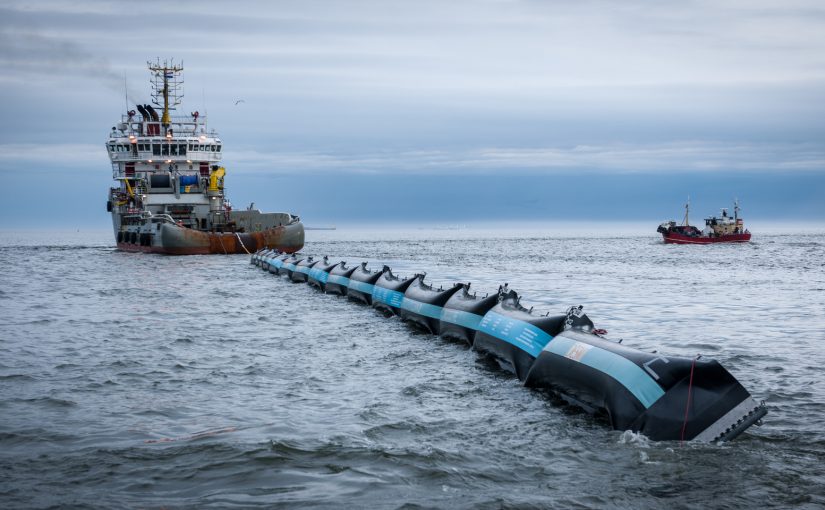
Reinigungsaktion im Pazifik
Ein sechshundert Meter langes Rohr, darunter hängt ein Vorhang – diese Konstruktion soll von San Francisco aus aufs offene Meer kommen. Dort soll sie als Plastikbarriere ihren Dienst aufnehmen. Der Erfolg des Projektes ist umstritten – und Kritiker befürchten sogar Beeinträchtigungen des Ökosystems. Beitrag lesen. Deutschlandfunk | Forschung aktuell | 7. September 2018 | 5…
-
Plastisphere Ep.1: Welcome to the Plastisphere
Subscribe to feed In this introduction to the Plastisphere podcast, Anja takes the listener on a journey back in time, from a remote plastic beach on the Big Island of Hawaii to the factory of a big chemical producer making bioplastics. She shares what she has learned about the issue of plastic pollution in the…
-
In Schleswig for Undark
Schleswig is a small town in the North of Germany. This spring, a major plastic leak there sparked a debate in Germany: Can a circular economy include shredding food waste and packaging together? For Undark, I went to Schleswig to find out what had happened:
-
Projekt “The Ocean Cleanup”: Eine Röhre gegen den Müll im Ozean
Den Pazifik vom Plastikmüll befreien: Der Niederländer Boyan Slat und sein Team vom “Ocean-Cleanup”-Projekt haben ein ehrgeiziges Ziel. Der von ihnen konstruierte Müllerfänger wurde nun erstmals zu Wasser gelassen. Doch was kann das Gerät wirklich gegen riesige Müllwirbel ausrichten? Mein Kollegengespräch mit Arndt Reuning gibt es hier online nachzulesen. Deutschlandfunk | Forschung aktuell | 04.06.2018…
-
Teilchenfänger: Ideen gegen Mikroplastik
Radio-Feature für die Sendung “Wissenschaft im Brennpunkt” Von Anja Krieger und Christine Westerhaus Deutschlandfunk | 4.6.2017 | 16:30 | 27 Minuten Online-Version lesen
-
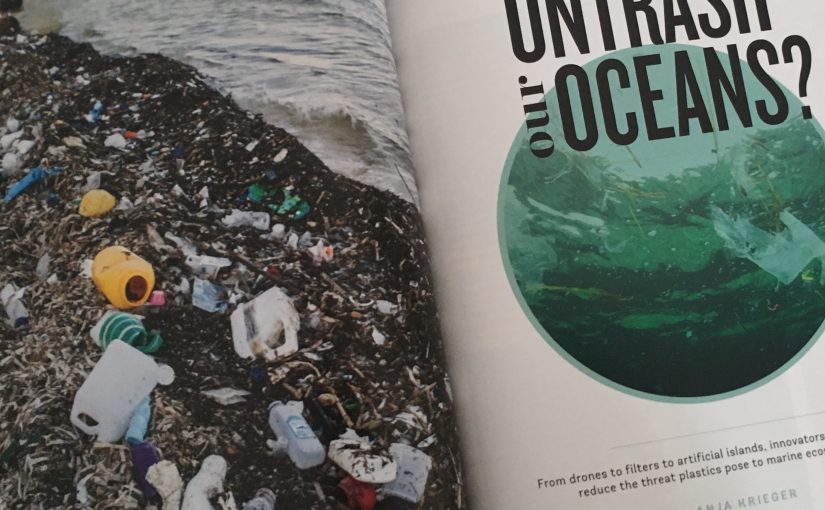
Ensia Best of Year
My long-read “What will it take to get plastics out of the oceans?” featured in the “Ensia Best of Year” print edition (online on Issuu)
-

Meereswaschmaschine in Not
Der junge Niederländer Boyan Slat hatte eine ambitionierte Idee: eine Art Meereswaschmaschine, die Müll von der Oberfläche des Nordpazifiks filtern soll. Nach vier Jahren Arbeit an der Vision wurde ein Prototyp in die Nordsee gesetzt. Doch nach zwei Monaten auf See musste die Konstruktion wieder an Land geholt werden. Beitrag lesen Deutschlandfunk | Forschung aktuell…
-
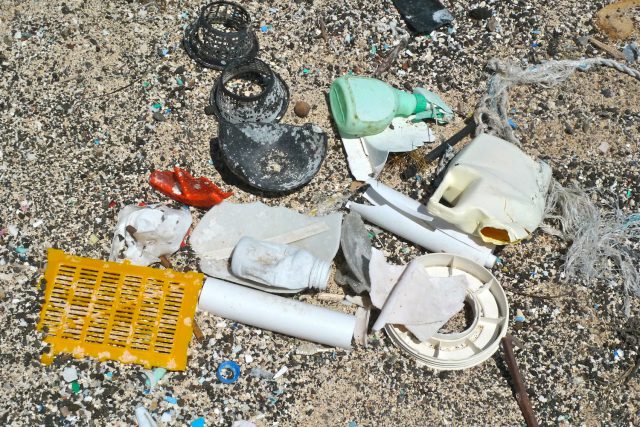
What will it take to get plastics out of the ocean?
From drones to filters to gigantic cleaning arrays, innovators are working to reduce the threat thousands of tons of trash pose to marine ecosystems. But how realistic are their plans, and how much of a difference will they be able to make? Read my article on Ensia An Earth Journalism Network Future Oceans Story, re-published…
-
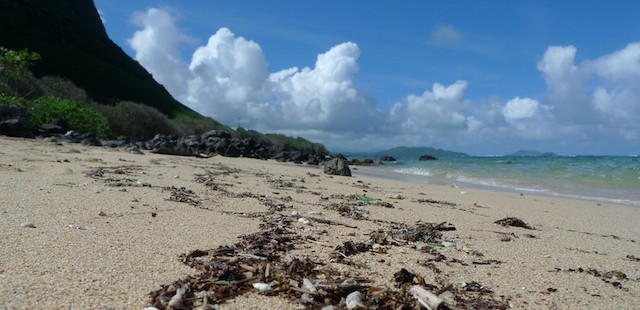
Deep-Sea Microplastics
— Report translated from German — According to a recent study, 270,000 tons of plastic waste are floating in the world’s oceans. That sounds like a lot, but the annual production of plastic is over a thousand times higher. So scientists are starting to wonder: Has the inventory of plastic in the oceans just scratched…
-

Spurensuche in der Tiefsee
Teile unseres Plastikmülls sammeln sich am Boden der Meere – das haben Forscher schon länger befürchtet. Nun sind sie in Proben aus dem Sediment der Tiefsee tatsächlich fündig geworden. Ich spreche darüber mit Richard Thompson, Mitautor der Studie.
-
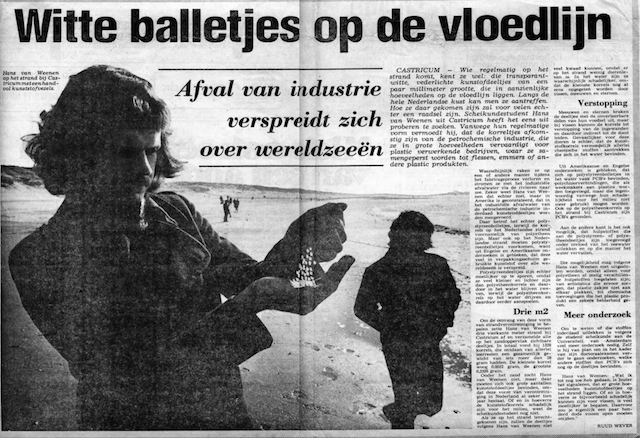
Die Tränen der Meerjungfrau
Hans van Weenen ist Anfang Zwanzig, als er am Strand seines holländischen Heimatorts Castricum kleine weiße Kügelchen aufliest: Plastik-Pellets für die Produktion, auf dem Weg in die Fabrik verloren gegangen. Es sind die Siebziger, die Lokalzeitung bringt einen langen Artikel. Doch die Zeit ist noch nicht reif. Bis die internationale Presse über Müllwirbel aus Plastik…
-
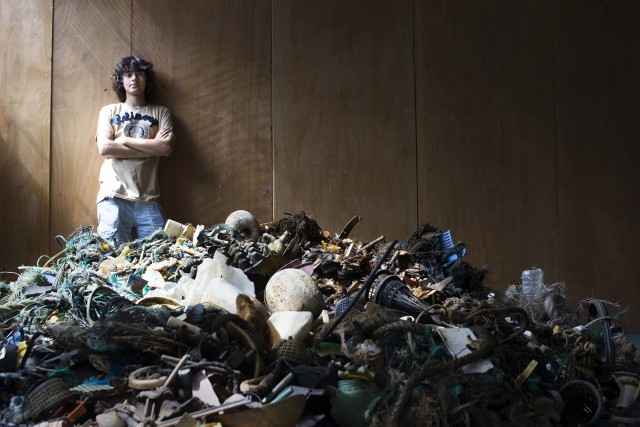
Der Müllmann der Meere?
Boyan Slat ist 18 Jahre alt, als er im Oktober 2012 auf die Bühne tritt. Schlaksig steht er in der Aula der Technischen Universität Delft, ein bisschen nervös und die langen braunen Haare tief im Gesicht. In fließendem Englisch präsentiert der junge Niederländer auf der TEDxDelft-Konferenz seine Idee: Eine Plattform, die den pazifischen Ozean vom…
-
Infografik zur Plastiktüte
Wie viele Plastiktüten verbrauchen wir in Europa pro Person? Wieso täte die Einschränkung dünner Tüten der Industrie nicht wirklich weh? Diese und weitere Zahlen zum Thema Tüte habe ich für die Infografik in der Zeit 50 zusammen gestellt.
-
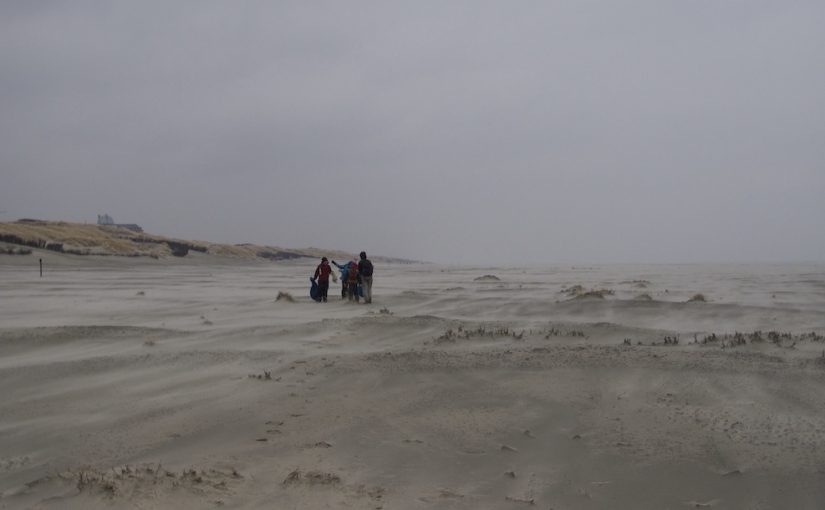
Mikroplastik in jeder Muschel
Toncollage: Stimmen aus dem Feature Auf der niedersächsischen Nordseeinsel Juist setzen sich Einwohner, Politiker und Umweltschützer gegen verschmutzte Strände ein. Vor allem Plastik wird zunehmend angetrieben. Jedes Jahr kurz vor Beginn der Saison wird der Strand aufgeräumt. Und dabei fallen den Insulanern so einige Geschichten ein – wie die von den weißen Turnschuhen, die einst…
-
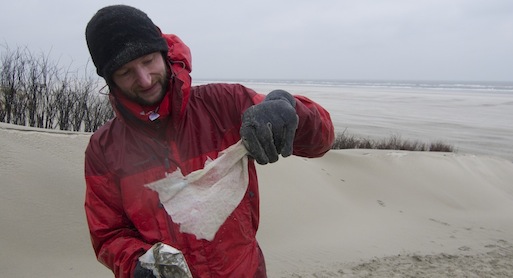
Plastik am Nordseestrand
Die Bewohner der Nordseeinsel Juist räumen seit Jahren das Plastik vom Strand. Zusammen mit Umweltschützern will der Bürgermeister die Inselumwelt vom Müllgut befreien. Nur was kann eine kleine Insel gegen das Treibgut aus dem Meer unternehmen? Vor allem, wenn er immer kleiner und kleiner und kleiner wird… Dienstag, 14. Mai, 13:07 im Länderreport auf Deutschlandradio…